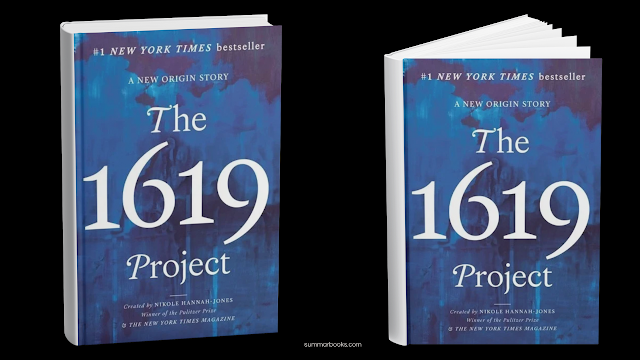The 1619 Project: A New Origin Story
"The 1619 Project: A New Origin Story," edited by Caitlin Roper and Ilena Silverman, is a profound exploration of the legacy of slavery in America and its enduring impact on contemporary society. This book expands upon the original 1619 Project, which was launched by The New York Times Magazine to mark the 400th anniversary of the arrival of the first enslaved Africans in Virginia. The book features essays, poems, and works of fiction that delve into the historical and cultural ramifications of slavery, offering a re-examination of American history through the lens of Black experiences. This summary will provide an in-depth look at the themes, contributions, and significance of the book, while also promoting its relevance in today's discourse on race and history.
The 1619 Project began as a journalistic endeavor but has since evolved into a comprehensive examination of the historical narratives that shape the United States. The book serves as a critical resource for understanding the complexities of American identity and the foundational role that slavery played in its development. Through a collection of essays and creative works, Roper and Silverman invite readers to reconsider the traditional narratives of American history, emphasizing the importance of Black voices and experiences.
Historical Context
The year 1619 marks a pivotal moment in American history—the arrival of the first enslaved Africans in the British colonies. This event set the stage for centuries of systemic racism and oppression that would shape the nation. The 1619 Project seeks to highlight how this legacy continues to influence various aspects of American life, including politics, economics, culture, and social justice.
The book is structured around several key themes, each addressing different facets of the African American experience. These themes include the economic foundations of slavery, the cultural contributions of Black Americans, the ongoing struggle for civil rights, and the pervasive impact of racism in contemporary society.
Key Themes and Contributions
1. The Economic Foundations of Slavery
One of the central arguments of "The 1619 Project" is that slavery was not just a moral failing but a fundamental economic engine for the growth of the United States. The essays explore how the exploitation of enslaved labor contributed to the wealth of the nation, particularly in the agricultural sector. This economic perspective challenges readers to recognize the deep-seated connections between slavery and modern capitalism.
2. Cultural Contributions
The book also highlights the rich cultural heritage that has emerged from the African American experience. From music and literature to art and cuisine, Black culture has profoundly influenced American identity. The essays and creative works included in the book celebrate this cultural legacy while also acknowledging the struggles and injustices that have accompanied it.
3. The Ongoing Struggle for Civil Rights
The 1619 Project does not shy away from addressing the ongoing fight for civil rights and social justice. The book examines key historical moments, such as the Civil Rights Movement, and connects them to contemporary issues like police brutality and systemic racism. This theme underscores the idea that the fight for equality is far from over and that understanding history is crucial for creating a more just society.
4. The Pervasive Impact of Racism
Throughout the book, the authors emphasize that racism is not merely a relic of the past but a persistent force that shapes American life. The essays explore how racism manifests in various institutions, including education, healthcare, and the criminal justice system. By illuminating these issues, the book encourages readers to confront uncomfortable truths about the nation’s history and its ongoing implications.
Notable Contributions
"The 1619 Project: A New Origin Story" features contributions from a diverse array of writers, historians, and artists. Each piece offers unique insights and perspectives, enriching the overall narrative. Some notable contributors include:
Nikole Hannah-Jones: The creator of the original 1619 Project, Hannah-Jones provides a compelling introduction that sets the tone for the book. Her work emphasizes the importance of recognizing the contributions of Black Americans to the nation’s history.
Ibram X. Kendi: A prominent historian and author, Kendi’s essay delves into the historical roots of racism and its implications for contemporary society. His work challenges readers to confront their own biases and consider the systemic nature of racism.
Clint Smith: A poet and essayist, Smith’s contributions reflect on the personal and collective experiences of Black Americans. His poignant writing captures the emotional weight of history and its impact on identity.
The Importance of Re-examining History
One of the most significant aspects of "The 1619 Project" is its call to re-examine the narratives that have traditionally dominated American history. The book argues that understanding the true origins of the United States is essential for addressing the injustices that persist today. By centering Black experiences and acknowledging the role of slavery in shaping the nation, readers are encouraged to engage in critical conversations about race, identity, and justice.
"The 1619 Project: A New Origin Story" is an essential read for anyone seeking to understand the complexities of American history and the ongoing impact of slavery. Through its powerful essays and creative works, the book challenges readers to confront uncomfortable truths and engage in meaningful discussions about race and justice. As we navigate the challenges of contemporary society, the insights offered in this book are more relevant than ever.
If you are interested in deepening your understanding of American history and the legacy of slavery, "The 1619 Project: A New Origin Story" is a must-read. This book not only provides a comprehensive overview of the historical context but also offers a platform for Black voices and experiences that have often been marginalized. By engaging with this work, you will gain valuable insights that can inform your perspective on race and justice in America. Don’t miss the opportunity to explore this transformative narrative—pick up your copy today!
.png)






